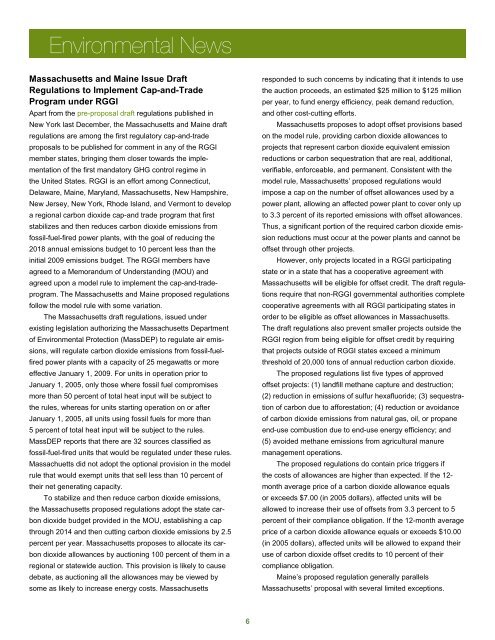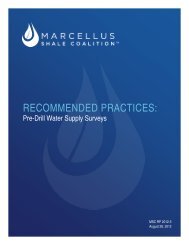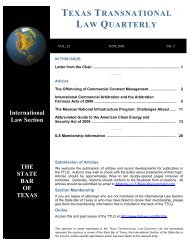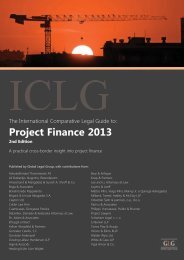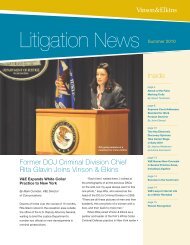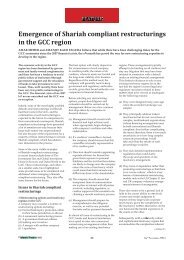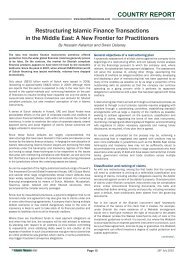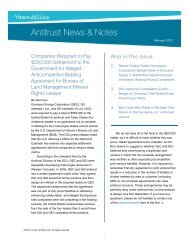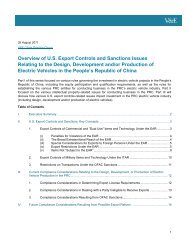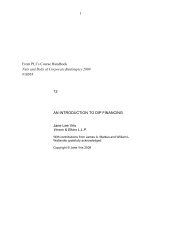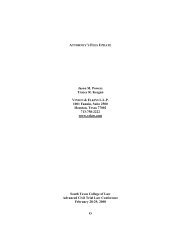Environmental News - Vinson & Elkins LLP
Environmental News - Vinson & Elkins LLP
Environmental News - Vinson & Elkins LLP
You also want an ePaper? Increase the reach of your titles
YUMPU automatically turns print PDFs into web optimized ePapers that Google loves.
<strong>Environmental</strong> <strong>News</strong><br />
Massachusetts and Maine Issue Draft<br />
Regulations to Implement Cap-and-Trade<br />
Program under RGGI<br />
Apart from the pre-proposal draft regulations published in<br />
New York last December, the Massachusetts and Maine draft<br />
regulations are among the first regulatory cap-and-trade<br />
proposals to be published for comment in any of the RGGI<br />
member states, bringing them closer towards the implementation<br />
of the first mandatory GHG control regime in<br />
the United States. RGGI is an effort among Connecticut,<br />
Delaware, Maine, Maryland, Massachusetts, New Hampshire,<br />
New Jersey, New York, Rhode Island, and Vermont to develop<br />
a regional carbon dioxide cap-and trade program that first<br />
stabilizes and then reduces carbon dioxide emissions from<br />
fossil-fuel-fired power plants, with the goal of reducing the<br />
2018 annual emissions budget to 10 percent less than the<br />
initial 2009 emissions budget. The RGGI members have<br />
agreed to a Memorandum of Understanding (MOU) and<br />
agreed upon a model rule to implement the cap-and-tradeprogram.<br />
The Massachusetts and Maine proposed regulations<br />
follow the model rule with some variation.<br />
The Massachusetts draft regulations, issued under<br />
existing legislation authorizing the Massachusetts Department<br />
of <strong>Environmental</strong> Protection (MassDEP) to regulate air emissions,<br />
will regulate carbon dioxide emissions from fossil-fuelfired<br />
power plants with a capacity of 25 megawatts or more<br />
effective January 1, 2009. For units in operation prior to<br />
January 1, 2005, only those where fossil fuel compromises<br />
more than 50 percent of total heat input will be subject to<br />
the rules, whereas for units starting operation on or after<br />
January 1, 2005, all units using fossil fuels for more than<br />
5 percent of total heat input will be subject to the rules.<br />
MassDEP reports that there are 32 sources classified as<br />
fossil-fuel-fired units that would be regulated under these rules.<br />
Massachuetts did not adopt the optional provision in the model<br />
rule that would exempt units that sell less than 10 percent of<br />
their net generating capacity.<br />
To stabilize and then reduce carbon dioxide emissions,<br />
the Massachusetts proposed regulations adopt the state carbon<br />
dioxide budget provided in the MOU, establishing a cap<br />
through 2014 and then cutting carbon dioxide emissions by 2.5<br />
percent per year. Massachusetts proposes to allocate its carbon<br />
dioxide allowances by auctioning 100 percent of them in a<br />
regional or statewide auction. This provision is likely to cause<br />
debate, as auctioning all the allowances may be viewed by<br />
some as likely to increase energy costs. Massachusetts<br />
responded to such concerns by indicating that it intends to use<br />
the auction proceeds, an estimated $25 million to $125 million<br />
per year, to fund energy efficiency, peak demand reduction,<br />
and other cost-cutting efforts.<br />
Massachusetts proposes to adopt offset provisions based<br />
on the model rule, providing carbon dioxide allowances to<br />
projects that represent carbon dioxide equivalent emission<br />
reductions or carbon sequestration that are real, additional,<br />
verifiable, enforceable, and permanent. Consistent with the<br />
model rule, Massachusetts’ proposed regulations would<br />
impose a cap on the number of offset allowances used by a<br />
power plant, allowing an affected power plant to cover only up<br />
to 3.3 percent of its reported emissions with offset allowances.<br />
Thus, a significant portion of the required carbon dioxide emission<br />
reductions must occur at the power plants and cannot be<br />
offset through other projects.<br />
However, only projects located in a RGGI participating<br />
state or in a state that has a cooperative agreement with<br />
Massachusetts will be eligible for offset credit. The draft regulations<br />
require that non-RGGI governmental authorities complete<br />
cooperative agreements with all RGGI participating states in<br />
order to be eligible as offset allowances in Massachusetts.<br />
The draft regulations also prevent smaller projects outside the<br />
RGGI region from being eligible for offset credit by requiring<br />
that projects outside of RGGI states exceed a minimum<br />
threshold of 20,000 tons of annual reduction carbon dioxide.<br />
The proposed regulations list five types of approved<br />
offset projects: (1) landfill methane capture and destruction;<br />
(2) reduction in emissions of sulfur hexafluoride; (3) sequestration<br />
of carbon due to afforestation; (4) reduction or avoidance<br />
of carbon dioxide emissions from natural gas, oil, or propane<br />
end-use combustion due to end-use energy efficiency; and<br />
(5) avoided methane emissions from agricultural manure<br />
management operations.<br />
The proposed regulations do contain price triggers if<br />
the costs of allowances are higher than expected. If the 12-<br />
month average price of a carbon dioxide allowance equals<br />
or exceeds $7.00 (in 2005 dollars), affected units will be<br />
allowed to increase their use of offsets from 3.3 percent to 5<br />
percent of their compliance obligation. If the 12-month average<br />
price of a carbon dioxide allowance equals or exceeds $10.00<br />
(in 2005 dollars), affected units will be allowed to expand their<br />
use of carbon dioxide offset credits to 10 percent of their<br />
compliance obligation.<br />
Maine’s proposed regulation generally parallels<br />
Massachusetts’ proposal with several limited exceptions.<br />
6


